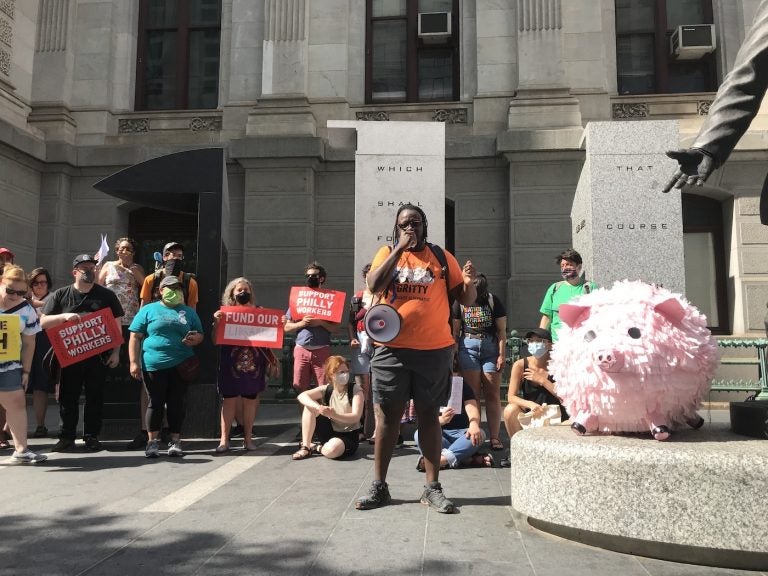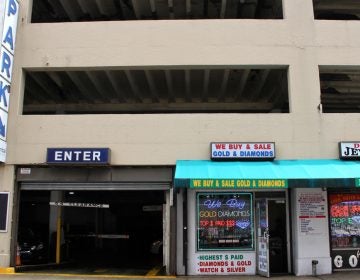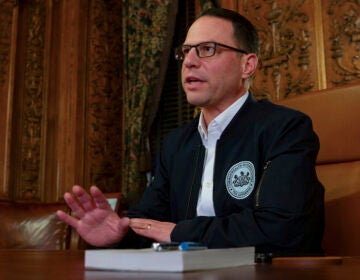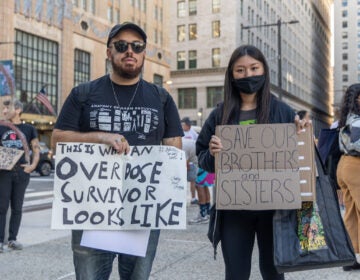Philly socialist groups, unions protest proposed city business tax cuts
Several groups decried Philly business and parking tax cuts, connecting them to larger economic inequalities worsened by the pandemic.

Shane Riggins, of Philadelphia Socialist Alternative, leads a protest by the group Tax The Rich PHL against proposed business tax cuts in the Philadelphia 2022 municipal budget. (Laura Benshoff/WHYY)
Outside City Hall, a couple dozen protesters hoisted a pig piñata, filled with candy and slips of paper with the names of wealthy local businessmen on them.
The protest theater was courtesy of Tax the Rich PHL, a coalition of left-leaning political groups and union members, and the latest to weigh in on the Philadelphia’s proposed 2022 budget.
The group came together to decry proposed business and parking tax cuts, connecting them to larger economic inequity which the coronavirus pandemic has exacerbated.
“The rich people have had it too good for too long,” said organizer Shane Riggins, of the group Philadelphia Socialist Alternative, over a loudspeaker. “As working-class people, we make them their money, and they have been hoarding it for too long,” he continued.
The protest underscored the differing political stances on how best to lead Philadelphia out of the recession. City councilmembers Kendra Brooks and Helen Gym have spoken out against the cuts, while Councilmember Alan Domb called for even bigger reductions in tax revenue.
At the protest, members of some of the city’s municipal unions, such as the Philadelphia Federation of Teachers’ Caucus of Working Educators and AFSCME’s progressive Unity Caucus said the cuts, and the projected $343 million loss in revenue they will create over five years, will hurt neighborhoods most devastated by pandemic losses. They also lobbied for using the stimulus money as a chance to invest more in community institutions as a means of economic development.
“The city budget has been woefully inadequate for years. Our schools, our libraries, and our parks are understaffed and underfunded,” said Sunita Balija, a librarian and member of AFSCME.
The debate comes at the end of what has been a rollercoaster year for municipal budgets.
In 2020, city officials scrapped their original budgets as the coronavirus pandemic sent revenues tumbling. This year, officials predicted a $450 million deficit before receiving a $1.4 billion infusion of coronavirus stimulus funds.
The Chamber of Commerce for Greater Philadelphia pushed back against the criticism that tax cuts come at the expense of city services.
“This is not an either/or opportunity,” said William Carter, the chamber’s vice president of local government advocacy and engagement.
Under the Mayor’s budget, the wage tax rate for city residents would drop from 3.87% to 3.82% over five years. Non-residents would see their wage tax rate fall from 3.5% to 3.42% over the same period of time.
The city’s parking tax would also drop from 25% to 22.5%, as a temporary hike is allowed to expire. A council bill introduced by member Cherelle Parker would drop it further, to 17%, for a total loss of $130 in revenues over five years.
Finally, the City’s business income and receipts tax (BIRT) would get a trim, lowering the tax on net business income by about one percentage point, from 6.2% to 5.25%, also over five years.
Carter said the Chamber would like to see these cuts happen even faster.
“When you have a hard stop with the pandemic, you need a jump start,” he said.
The Kenney administration defended its position.
“The Administration proposed wage and BIRT tax cuts because studies indicate that these measures will create jobs for Philadelphians, which is needed more than ever to drive an equitable recovery from the pandemic,” wrote spokesperson Deana Gamble. She also highlighted areas of the proposed budget which do put more money into neighborhoods, such as dollars earmarked for services such as “street paving, street sweeping, investments in our small businesses on commercial corridors as well as in education from PHLpreK to community college.”
Philadelphia officials have until the end of this month to pass a budget.

Get daily updates from WHYY News!
WHYY is your source for fact-based, in-depth journalism and information. As a nonprofit organization, we rely on financial support from readers like you. Please give today.






